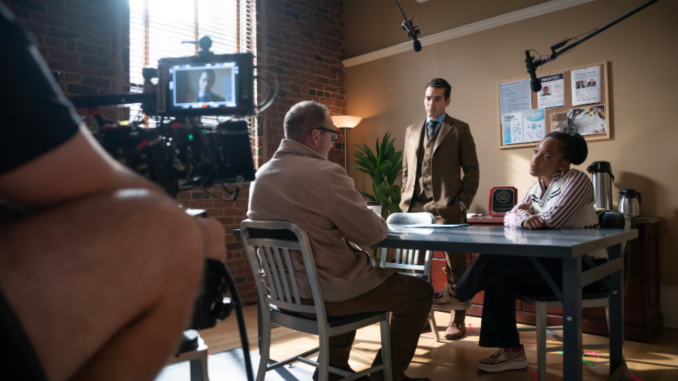
During production on the second season of “Will Trent,” which was filmed and set in Atlanta, the cast and crew got the news every TV show wants to hear: ABC had given them a third season.
“I’ve never had that experience before,” said Ramon Rodriguez, who plays Will Trent, a Georgia Bureau of Investigation agent with a mix of eccentricities and traumas. “We had to tell everyone in person. It was a celebratory and somewhat surreal moment. We had to thank the crew. Then we had to go in and shoot a scene.”
Viewership has been steadily rising, giving ABC a police procedural that could potentially last multiple seasons. ABC said the third episode of the season had its highest viewership ever. The show, based on the book series by Atlanta author Karin Slaughter, wrapped its second season last month at Eagle Rock Studios in Norcross, where it shares space with Paramount+’s “Tulsa King,” starring Sylvester Stallone.
“We’re doing it right,” Rodriguez said. “It feels great. People are watching and spreading the word.”
Actress Erika Christensen, who plays tough Atlanta cop Angie Polaski, enjoyed six seasons of NBC’s “Parenthood” from 2010 to 2016. She said she’s an eternal optimist when it comes to a show that has longevity. She even bought a house in Atlanta before a second season was guaranteed.
“But that’s OK,” she said. “Atlanta is great!”
Jake McLaughlin, who plays Angie’s detective partner Michael Ormewood, is just enjoying the ride.
“It’s like striking gold,” McLaughlin said. “I do a lot of pilots. Some of them last a season. That’s human nature. I have five kids and I live in Idaho. I’m so grateful to be here. I’ll never retire!”
“Will Trent” only has ten episodes this season because of last year’s writers’ and actors’ strike, but will have at least 18 episodes for the third season, which will return in early 2025. The season finale will air on May 21. The sixth episode of the second season, which aired on April 9, ends on a happy note as all the main players gather for a buffet dinner. Will, a foster child who has just learned details about his mother, introduces his lovable uncle Antonio (John Ortiz), a family member he had just met a few days earlier.
“Family is something he’s always wanted,” Rodriguez said. “It’s the first time he’s met someone who’s his biological family and can answer some of his questions about his mother and his childhood and what happened. The ending of that episode was really sweet. It’s his personal life combined with his work life. It’s heartwarming.”
But happiness is never a lasting feeling on a show like this. By episode 10, Angie herself is in trouble. There’s a heated interaction and she defends her actions in front of Will in an interrogation room scene.
“The past has come to bite her,” Christensen said on set last month. “This season finale is so big, it could be a feature-length episode.” Regular episodes take eight days to shoot. The season finale took 11 days. Will and Angie, who have known each other since childhood, tend to hook up and break up frequently. “When they break up, they know they can get back together,” Christensen said ahead of episode seven, which airs April 30. “They both have the best make-up we’ve ever seen and the worst breakup we’ve ever seen, both are coming up.”
Rodriguez says Will keeps having flashbacks to himself 12 his age, which came to a head in episode seven. “We didn’t know what that meant,” he says. “That started to come to a head. It was really complicated.”
On set, the dingy Atlanta Police Department offices and the much more luxurious GBI offices sit side by side. Will and GBI agent Faith Mitchell (Iantha Richardson) have their own offices across the hall from each other and are often seen in them. The set designers provided each with generic photos of metropolitan Atlanta on the walls like the Gold Dome. The only real personalization in Will’s office is a photo of his mother, which he occasionally looks at.
By contrast, APD detectives Angie and Michael have small metal desks across from each other in the open office area, desks they rarely use. To convey the action, they almost always stand, not sit.
Christensen chose to conduct the interview in Faith’s nicer office space, rather than her fake desk.
“The GBI has a bigger budget and probably more interesting cases,” Christensen said. “We find it funny that they have this fancy place.”
She noted that “the APD cases we work on don’t have a lot of risk because what happens happens. Sometimes by accident. But the GBI cases